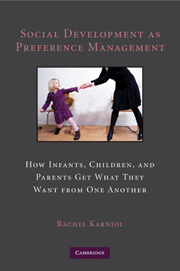 Social Development as Preference Management
Social Development as Preference Management Book contents
- Frontmatter
- Contents
- Acknowledgments
- Introduction
- 1 The Baby “Preference Game”
- 2 Children's Expression of Preferences
- 3 Emerging Meta-Preferences
- 4 Other People's Preferences
- 5 Parenting and Preference Management
- 6 Channeling Children's Preferences
- 7 Temporizing Preferences
- 8 Restricting Children's Preferences
- 9 Disciplining Noncompliance
- 10 Planes of Transformational Thought: Temporal, Imaginal, and Mental
- 11 Manipulating Others
- 12 Coping and Self-Regulating
- 13 Mind Play: Applying Transformational Thought
- 14 Minding One's Own Versus Others' Preferences: Altruism, Aggression, and Morality
- 15 Tying Up
- References
- Subject Index
- Name Index
15 - Tying Up
Published online by Cambridge University Press: 05 June 2012
- Frontmatter
- Contents
- Acknowledgments
- Introduction
- 1 The Baby “Preference Game”
- 2 Children's Expression of Preferences
- 3 Emerging Meta-Preferences
- 4 Other People's Preferences
- 5 Parenting and Preference Management
- 6 Channeling Children's Preferences
- 7 Temporizing Preferences
- 8 Restricting Children's Preferences
- 9 Disciplining Noncompliance
- 10 Planes of Transformational Thought: Temporal, Imaginal, and Mental
- 11 Manipulating Others
- 12 Coping and Self-Regulating
- 13 Mind Play: Applying Transformational Thought
- 14 Minding One's Own Versus Others' Preferences: Altruism, Aggression, and Morality
- 15 Tying Up
- References
- Subject Index
- Name Index
Summary
Throughout this book, I have presented preferences and preference management as the unifying theme of social development, suggesting that conveying our preferences to others, having them convey their preferences and their external preferences to us, and deciding how to implement this knowledge in guiding our behavior and pursuing our preferences is at the heart of human sociality. When infants are born, they are unable to pursue their preferences without others’ help. As discussed in Chapters 1–4, mothers convey to infants the need to communicate their preferences so they can initiate preference alignment on their behalf, and infants’ emergent capacities are used by them to communicate their preferences to others, and, gradually, to learn of others’ preferences. We saw in Chapters 1 and 2 how gestures, and then language, are put to work to this end, as infants and children inform and tell others what they want and are told by others what they want for and from them. As part and parcel of doing so, as discussed in Chapters 3 and 4, children learn to think of themselves and of others as agents with preferences, with the perceived stability of preferences accounting for how both self and others are viewed. Concomitantly, as elaborated in Chapters 5–9, mothers’ socialization practices and their responsiveness to children's expressed preferences implicitly expose children to parental preferences but they also reveal the self – other preference gap, both because children often recognize their own preferences to be different than the ones parents attempt to socialize and because repeated experiences with parents who are unwilling to accommodate to their preferences force children to confront this gap.
- Type
- Chapter
- Information
- Social Development as Preference ManagementHow Infants, Children, and Parents Get What They Want from One Another, pp. 316 - 322Publisher: Cambridge University PressPrint publication year: 2010


